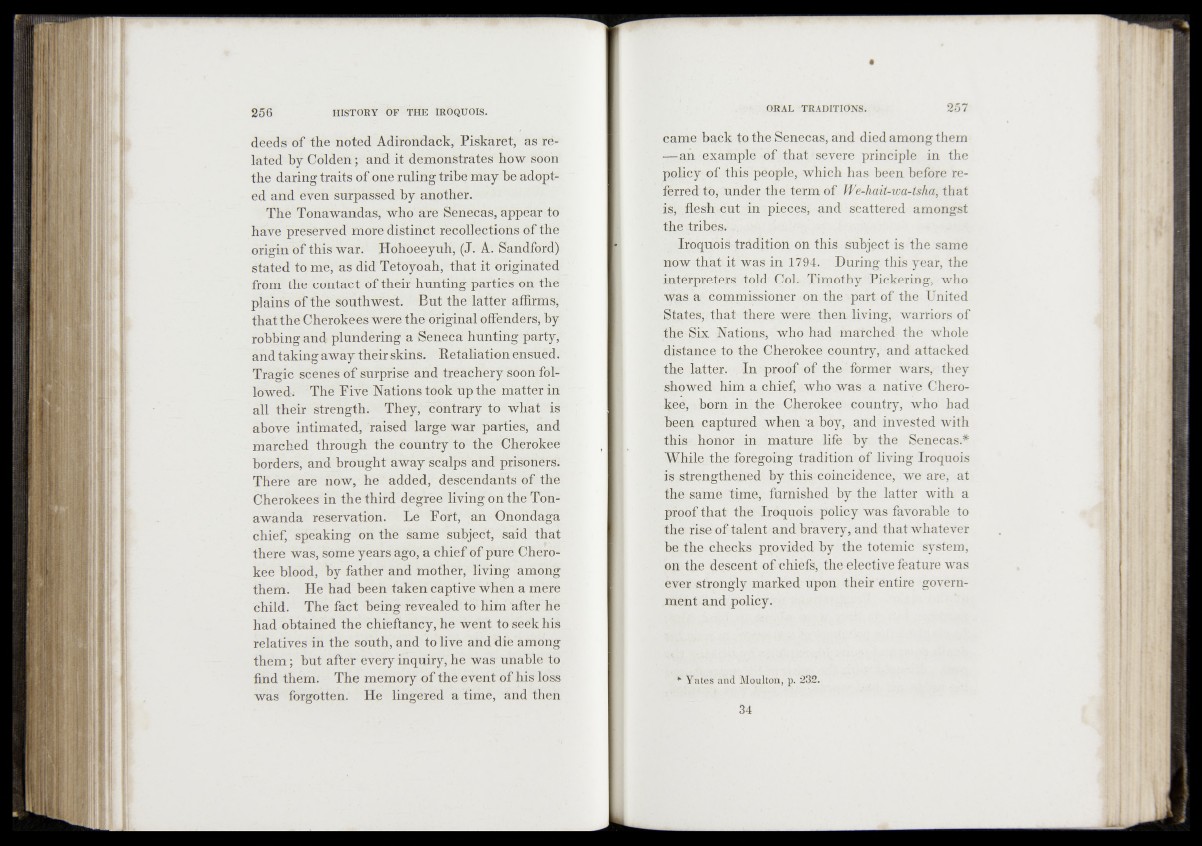
deeds of the noted Adirondack, Piskaret, as related
by Colden; and it demonstrates how soon
the daring traits of one ruling tribe may be adopted
and éven surpassed by another.
The Tonawandas, who are Senecas, appe&rto
have preserved more distinct recollections of the
origin of this war. Hohoeeyuh, (J. A. Sandford)
stated to me, as did Tetoyoah, that it originated
from the contact óf their hunting parties on the
plains of the southwest. But the latter affirms,
that the Cherokees were the original offenders, hy
robbing and plundering a Seneca hunting party,
and taking away their skins. Retaliation ensued.
Tragic scenes of surprise and treachery soon followed^
The Five Nations took up the matter in
all their strengths They," contrary to what is
above intimated, raised large war parties, and
marched through the country to the "Cherokee
borders, and brought away scalps and prisonérs?
There are now, he added, descendants of the
Cherokees in the third degree living on theTon-
awanda reservation. Le Fort, an Onondaga
chief, speaking on the same subject, said that
there was, some years ago, a chief of pure Cherokee
blood, by father and mother, living among
them. He had been taken captive when a mere
child. The fact being revealed to him after he
had obtained the chieftancy, he went to seek his
relatives in the south, and to live and die among
them; but after every inquiry, he was unable to
find them. The memory of the event of his loss
was forgotten. He lingered a time, and then
came back to the Senecas, and died among them
t—ah example of that severe principle in the
policy-of this people, which has been before referred
to, under the term of We-haiUwa-tsha, that
is, .Êesk-eut in pieces* and scattered amongst
the tribes.-. ,
Iroquois tradition on this subject is the same
now that it was in 1794. Buring this year, the
interpreters told Cob Timothy Pickering, who
was a commissioner on the part of the United
Statesythat there were, then, living, warriors of
th^Vpik Nations, who had marched the whole
distance to the Cherokee country, and attacked
the latter. In proof of the former wars,, they
showed him a chief, who was a native Cherokee,
born in the Cherokee country, who had
been captured when u boy, and invested with
this ;hG1fo? hi mature life by the Senecas.*
While Vhe foregoing tradition of living Iroquois
is strengthened by this coincidence, we are, at
the same time, furnished by the latter with a
proof that the Iroquois policy was favorable to
the rise of talent and bravery, and that whatever
be the checks provided by the totemic system,
on the descent of chiefs, the elective feature was
ever strongly marked upon their entire government
and policy.
* Yates and Moulton, p. 232.